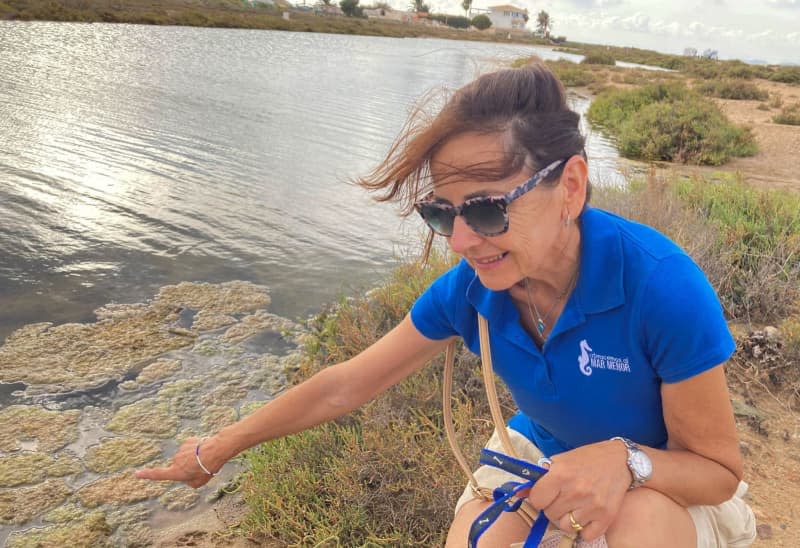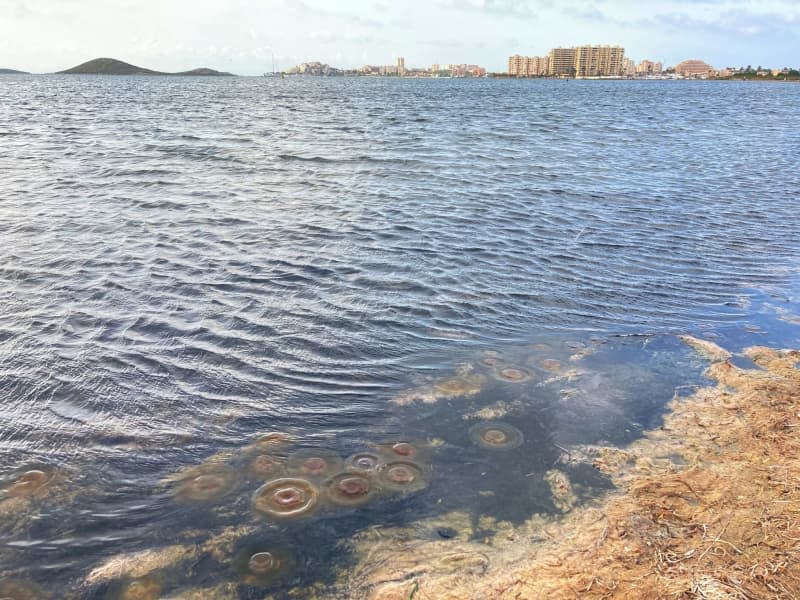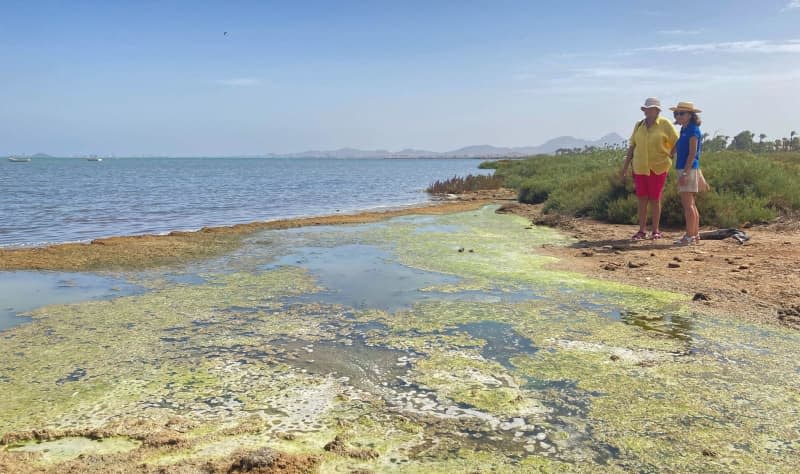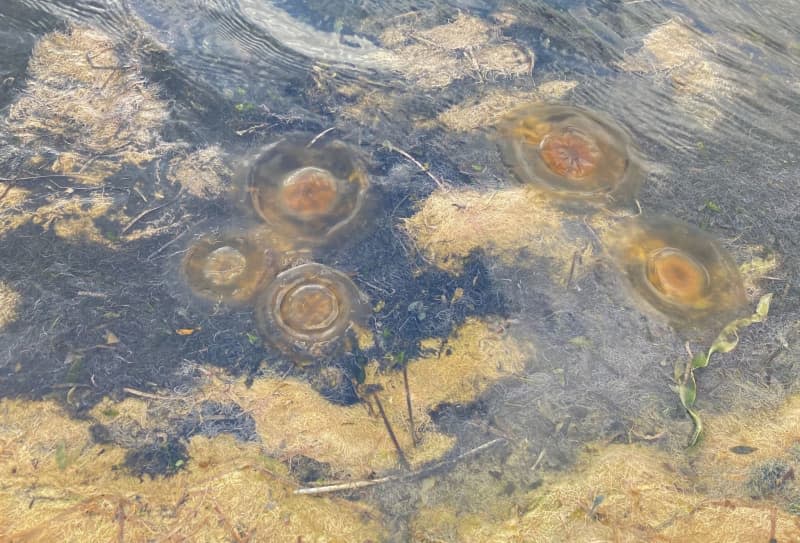Veggies in Germany are insanely cheap - but come at a price for Spain

The breeze wafting across Playa de los Alemanes, which - tellingly - translates as Beach of the Germans, carries a pungent smell.
It's a lovely, warm summer evening but the beach, just like all others along Spain's Mar Menor lagoon, is completely deserted.
The odd runner makes their way past empty restaurants facing out on Europe's largest saltwater lagoon in south-eastern Spain. Dogs are the only ones daring to dip a paw into the water, a dark broth of algae with countless dead jellyfish floating on the surface.
Marta Añíbarro, who grew up in the area, says the water in the lagoon used to be crystal-clear when she was a child, "and even up until a few years ago."
"Due to the high salt content, you could literally float and relax in the midst of the seahorses," she says. The lagoon, which covers an area of around 170 square kilometres and is only a couple of metres deep, separated from the Mediterranean Sea by a narrow sandbank, is a natural paradise that is perishing, complains the 60-year-old entrepreneur and activist. "I always feel like crying here. This must be the end of the world."
It has become almost impossible to spot sea horses in the lagoon, Añíbarro says.
While mass tourism, so prevalent along Spain's Mediterranean coast, has certainly played its part, scientists, activists and even the leftist government in Madrid blame hyper-intensive agriculture practices in the region for the demise of the lagoon.
Everything changed from the mid-1990s with the implementation of a major irrigation project in the Campo Cartagena cultivation area in the Murcia region, they say.
Companies began to grow crops like lettuce, broccoli, tomatoes, grapes and lemons at a large scale - and low cost. Most recently, around 30% of Campo de Cartagena's annual exports of 2.5 million tonnes of produce went to Germany where retailers are able to sell them for very competitive prices.
The cultivation of ultra-cheap vegetables is also an issue for other Spanish regions like Andalucia, where tens of thousands of hectares are covered in greenhouses made from white plastic sheeting.
While Andalucia, which has the hottest and driest climate in Spain, is primarily struggling with water scarcity, the Mar Menor area, hundreds of kilometres to the north, is seeing other effects of the agro-farming.
In 2016, the water in the lagoon suddenly turned green overnight, emitting a foul odour, the result of a harmful accumulation of nutrients used in agriculture such as nitrates and phosphates.
In addition to fresh water, a lot of fertilizer-laden sludge enters Mar Menor, especially during heavy rainfall. This leads to a proliferation of algae and bacteria, which ultimately causes a lack of oxygen depriving fish and other creatures of their basis of life.
"We had never experienced anything like this here, it was a real eye-opener," says Isabel Rubio of the 2016 events. The 72-year-old former teacher is the coordinator of the Pacto por el Mar Menor initiative fighting for the lagoon's preservation.
She has also been involved in organizing Let's Embrace of Mar Menor since 2021, a human chain that symbolically embraces the lagoon every summer.
Fellow environmental activist Añíbarro, who founded the event, says retailers and consumers in Germany, who benefit from the cheap crops produced here, also play their part in the marine habitat's demise.
This view is shared by Environmental Action Germany (DHU), a German non-profit organization. "The mass cultivation of cheap vegetables for the European market is leading to a devastating environmental disaster in Murcia, Spain, for which German supermarket groups also bear a decisive share of responsibility," it said in a recent statement, citing a survey conducted together with the Spanish environmental organization Ecologistas en Acción.
The study looked at the purchasing behaviour of major German supermarket chains, including Aldi Nord, Aldi Süd, Lidl, Rewe and Edeka. The retailers surveyed emphasise that they are committed to sustainable cultivation in Spain. They also stressed that they prefer to offer fruit and vegetables from Germany if available.
But DHU Federal Managing Director Sascha Müller-Kraenner is not convinced. Instead of relying on up to four harvests a year, artificial fertilisers and pesticides, the supermarkets should be committed to renaturalising the land, he demands. There is no question that the Mar Menor lagoon is "suffocating," as Müller-Kraenner puts it. The events of 2016 were the first major warning, he says.
In 2019, another one followed when 3 tonnes of dead sea creatures were washed up on the lagoon's shores within the course of a few hours. The sad spectacle was repeated in August 2021, when 4.5 tonnes of dead animals were retrieved from the water.
While the central government in Madrid has passed some measures to intervene, its powers are limited in the Autonomous Community of Murcia.
Since 2022, the Environment Ministry has managed to force the shutdown of more than 8,000 hectares of land (out of a total of over 400,000 hectares in the region of Murcia) that had been illegally irrigated. The central government also plans to make a total of €484 million ($531 million) available for measures to restore the ecosystem by 2026.
While environmentalists and the government in Madrid are calling for more measures for more sustainable cultivation, which would of course reduce profits, farmers and the regional government reject the idea of "criminalising the workers." A lot of money is at stake. According to the regional agricultural association Proexport, exports brought in some €3 billion last year. Proexport boss Mariano Zapata maintains that its members have carried out "a sustainable transformation of agriculture that is unprecedented in Europe."
But as Madrid and the right-wing regional government continue to trade blame and squabble over responsibilities, with both sides favouring different solutions, the situation is getting worse and worse.
Last summer, the Mar Menor fishermen's association reported a 90% drop in yields from the lagoon. "Many fishermen have not been paid for some time. This has never happened before," said José Blaya, head of the association.
By collecting more than 640,000 signatures, the activists succeeded in making Mar Menor the first ecosystem in Europe to be considered a legal entity with enforceable rights by parliamentary resolution. "There are already many protective laws, but they are not respected," says Rubio.
An amateur diver, Rubio has so far not seen any improvement in the lagoon. On the contrary: "When diving, you only see thousands of jellyfish that didn't used to exist." Seahorses, gilt-head bream, octopus and groupers are now practically "nowhere to be seen."




